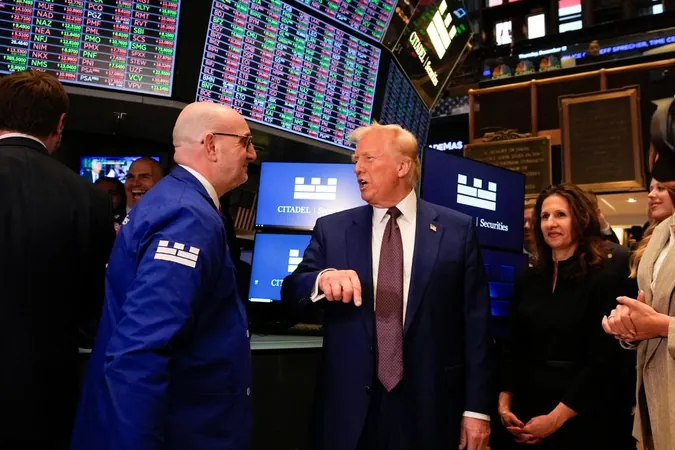
Shocking Banking Overhaul? Trump Team Explores Abolishing FDIC Amid Massive Deregulation Push!
2024-12-13
Author: Ting
In a surprising turn of events, advisers to President-elect Donald Trump are reportedly considering the contentious idea of dissolving the Federal Deposit Insurance Corporation (FDIC). This potential move signals a broader initiative aimed at dramatically deregulating the financial system, according to a recent report by the Wall Street Journal.
As the Trump transition team delves into a comprehensive review of banking regulations, they are openly discussing various methods to consolidate or even eliminate key regulatory agencies in Washington, D.C. Prominent among these discussions is the speculation that deposit insurance might be transferred to the Treasury Department's oversight.
This announcement comes on the heels of troubling revelations concerning the FDIC's workplace environment, including a report from a law firm that exposed alleged widespread sexual harassment and misconduct within the agency. The findings raised serious concerns about the FDIC's internal culture and effectiveness.
With Martin Gruenberg, the current chair of the FDIC, set to step down next month, the timing of these discussions raises eyebrows. Abolishing the FDIC, which was established nearly a century ago during the Great Depression, would necessitate congressional approval. The agency insures deposits up to $250,000 per depositor, playing a crucial role in maintaining public trust in the banking system—a confidence that has waned significantly following recent bank collapses, including those of Silicon Valley Bank, Signature Bank of New York, and First Republic Bank.
Among other regulatory bodies, the Office of the Comptroller of the Currency (OCC), created during the Civil War, also faces scrutiny. While discussions surface about merging the FDIC, OCC, and even the Federal Reserve, there is widespread concern regarding the implications of such a significant deregulation.
Sheila Bair, former chair of the FDIC during the Bush administration, expressed skepticism about the plausibility and desirability of these drastic changes. She noted that while banks may grumble about regulation, they generally prefer to maintain relationships with their regulators. "They like the status quo," Bair remarked, emphasizing the complexities involved in any potential legislative changes.
Additionally, Treasury secretary-designate Scott Bessent and members of an advisory group co-chaired by Tesla CEO Elon Musk and former GOP presidential candidate Vivek Ramaswamy, known as the Department of Government Efficiency (DOGE), are actively involved in proposing new banking oversight strategies. Musk has previously advocated for the elimination of the Consumer Financial Protection Bureau, an agency established after the 2008 financial crisis under the guidance of Senator Elizabeth Warren.
The debate surrounding banking regulation in the U.S. is at a critical juncture, and as discussions unfold about a potential overhaul of regulatory agencies, the consequences could be monumental. Will lawmakers align with the Trump administration's vision of a streamlined financial landscape, or will the pushback from public outcry and banking advocates stifle these ambitious proposals? The financial future remains uncertain as stakeholders closely monitor these developments.


 Brasil (PT)
Brasil (PT)
 Canada (EN)
Canada (EN)
 Chile (ES)
Chile (ES)
 España (ES)
España (ES)
 France (FR)
France (FR)
 Hong Kong (EN)
Hong Kong (EN)
 Italia (IT)
Italia (IT)
 日本 (JA)
日本 (JA)
 Magyarország (HU)
Magyarország (HU)
 Norge (NO)
Norge (NO)
 Polska (PL)
Polska (PL)
 Schweiz (DE)
Schweiz (DE)
 Singapore (EN)
Singapore (EN)
 Sverige (SV)
Sverige (SV)
 Suomi (FI)
Suomi (FI)
 Türkiye (TR)
Türkiye (TR)